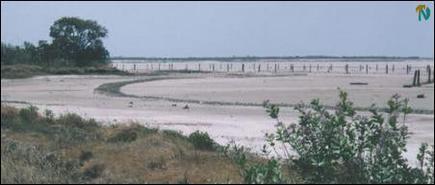Lagoon mines portend danger to Prawn fishermen
[TamilNet, Sunday, 02 February 2003, 00:44 GMT]
War has turned Elephant pass lagoon, well known for high quality prawn harvesting, into an area full of landmines, virtually disabling any immediate attempts to resume the traditional trade by fishermen of that area, sources in Vanni said.
Sources say that the Sri Lanka Army (SLA) fearing infiltration of Liberation Tigers (LTTE) through the lagoon to launch surprise attacks at the sprawling Elephant Pass camp, may have buried unknown quantities of landmines in areas surrounding the lagoon. Further, SLA has buried large quantities of "punji stakes," a technique first employed by the Vietcong women in the Vietnam war where sharpened, fire-hardened, bamboo sticks are buried inside traps to pierce through boots of unsuspecting US soldiers, in several areas of the elephant pass lagoon. Vietnam war statistics reveal that more than 2% of injuries sustained in the war was due to these traps. These stakes, when the water level in the lagoon is low, are clearly visible to visitors passing through the A9 highway. Fishermen from the areas of Elephant Pass, ThattuvanKotti, Upparu and Umaiyalpuram lament that they cannot ply their traditional trade because of the danger due to landmines and the punji stakes. During rainy season the influx of saltwater from the ocean into the lagoon brings with it rich resources including prawns and fish. The lagoon provides a breeding ground for prawns. When the water levels recede, the lagoon water is left with abundance of prawns and fish providing a lucrative business for the area fisherman. Fishermen have urged the authorities in Vanni to take efforts to clear the areas in elephant pass enabling them to resume their trade after an absence of several years.

Elephant Pass lagoon showing rows of sharpened 'Punji' stakes in a curved formation. The taller stakes further from the shore are aimed at restricting movement of boats.
|











